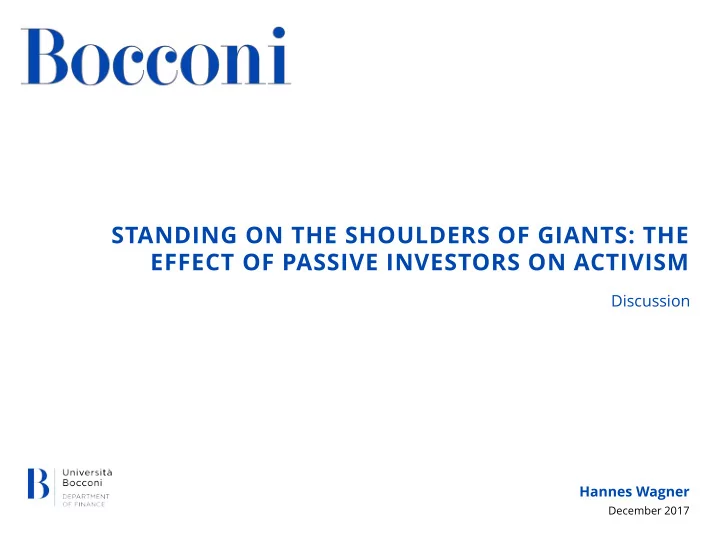

STANDING ON THE SHOULDERS OF GIANTS: THE EFFECT OF PASSIVE INVESTORS ON ACTIVISM Discussion Hannes Wagner December 2017
What the paper does — Analyze the effect that passive investors have on shareholder activism — Specifically, how activist campaigns and their tactics depend on the presence (and implied support) of passive investors (index funds) — Data: 1) US index fund portfolio holdings, 2) US activist campaigns — Identification strategy – use Russell 1,000/2,000 index cutoff to exogenously determine aggregate stake that passive investors hold in firm x — Presence of passive investors • Unrelated to likelihood that firm is targeted by activists • Positive related to Likelihood that activist campaign features score relatively high on “aggressiveness” scale; relationship likely causal — Conclusion: Passive investors appear to mitigate free-rider problems, help activists execute successful engagements
Findings and contribution — Paper fits nicely into fast-growing literature on interaction between passive and active investors — Economic magnitudes are impressive — Identification strategy is credible — Clear potential to make significant contribution — I very much like the paper — Consider including it in your PhD course syllabi
Issues worthwhile exploring more: Are th e thes ese ef effec ects ts per permanent or tr trans nsient? Appel Gormley Keim 2016 JFE “We find no evidence, however, that greater ownership by passive mutual funds is associated with more activism by non-passive institutions; instead, we find evidence of les less activism by non-passive institutions, consistent with passive investors monitoring managers and reducing the need for activism by other investors […] This magnitude is large ge given that a firm’s likelihood of an activism event in a given year in our sample is, on average, only 1.6%.” Appel Gormley Keim 2017 (this paper) “We find that the estimated effect of passive ownership on the likelihood of activism is statistically indistinguishable from zero. […] These estimates differ slightly from those found in AGK who document a similarly small, but statistically significant [negative effect].” Q: Will we find the paper’s main effect if we re-visit the data in x years?
Comment 2: Implication is that rising passive ownership contributes to increasingly hostile activist campaigns — Seems possible but unlikely David Trenchard, formerly Knight Vinke — What about markets where proxy fights are not the way to win? • A paper I know well: Becht, Franks, Grant, Wagner (2017) RFS
What role do passive investors play outside the US? And – is the activist business model converging globally? — Italy – most activist engagements in relative terms after US, but activism does not involve proxy fights — Japan – most activist engagements in absolute terms after US, but US-style activism has mostly failed
Comment 3 – Wolf Packs — Much recent attention, including SEC in 2015, on wolf packs • activist engagements involving multiple funds for the same target firm • observable and hidden types — We see higher success rates (outcomes, performance) for wolf pack activism. — But causality is hard to establish • Do we see higher success rates for wolf pack engagements because hedge funds coordinate and hunt as a pack..? • …or do we see multiple funds in the same engagement but without coordination, rather like “if you go to a Grateful Dead concert, you’re going to find a lot of Grateful Dead fans” (Phil Goldstein, Bulldog Investor, one of the targets of the SEC’s 2015 inquiries)
Comment 4 – What do we gain from IV? Is it worth it? Could you show direct, uninstrumented, estimation? — Coefficients are the same? Different? — IF SAME: I would be curious what effect of other shareholders is (active funds, hedge funds) — IF DIFFERENT: Coefficient differences? Why? Is IV estimate potentially biased? • Please read Wei Jiang’s 2017 RCF (polite) summary of IV estimates
Other comments — Number of board seats sought – scale by board size? — Table 7 – passive investors lead to higher probability of activist settling (which paper refers to as a sucess) • But no increase in «activist wins» and no decrease in «firm wins» • Why not? I am puzzled. Settlements may be okay but activists want to win
Conclusion — Interesting question — Excellent execution and tight paper — Novel and interesting empirical findings — I greatly enjoyed reading the paper
Recommend
More recommend